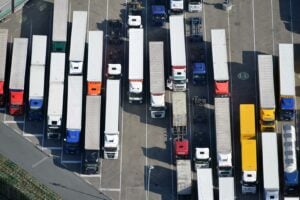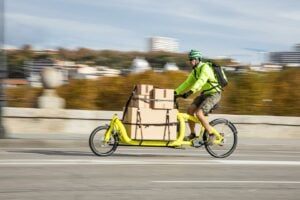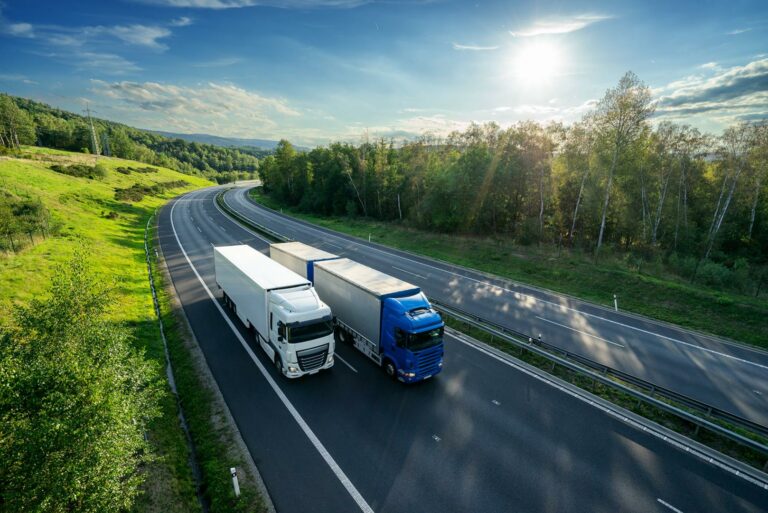Many logisticians in the EU would probably agree with this statement today: If there were a little less competition, the situation would certainly not be worse for one’s own company. No wonder, the competitive pressure in the industry is very high – perhaps even higher than in most other industries on the continent.
In view of this, generally operating transport companies have been finding it increasingly difficult for years. Under these conditions, it may not only be economically expedient, but even necessary for survival for some companies to (also) orient themselves towards logistics niche products. However, it is not only the type of product that counts, but also the way in which logistics companies can make a good name for themselves and generate long-term success through additional services.
1. An industry under pressure: reasons for the current situation
Logistics companies exist all over the world. However, in hardly any other region is the competitive pressure in the general transport sector as immense as in Europe. The reasons behind this can be clearly understood, but cannot be explained in a few words.

(stock.adobe.com © monticellllo)
Statistics are important for understanding the situation. In 2018 (the last survey year published to date), there were 1.01 million companies in the then EU-28 nations (i.e. before Brexit) that were dedicated to land transport. Although pure land transport companies are not broken down separately, the EU statisticians also include companies that transport via pipelines. Nevertheless, it should be clear to any logistician that a large part of these million companies handle typical road transport.
Without comparative values, however, such figures tend to appear abstract. For this purpose, let us draw a comparison with a relatively(!) similar country, the USA:
| EU-27-States | USA | |
| Area | 4,2 million km² | 9,8 million km² (8,08 without Hawaii and Alaska) |
| Population | 447 million | 333 million (328 without Hawaii and Alaska) |
The USA and the CONUS (= Continental United States, the 48 contiguous states of the heartland of America) not only have about twice as much area, but also a significantly greater difference between metropolitan regions and very lonely stretches of land – while the EU is more homogeneously populated. However, on the other side of the Atlantic there were only 600,000 trucking companies and trucking carriers at last count.
Even taking the population difference into account, this is a dramatic difference. Especially when the sometimes enormous distances between the metropolitan regions are included and the fact that freight transport by rail and waterways plays a lesser role in the USA than in Europe, where truck logistics is the main form of transport.
This means that (not only) in comparison with the USA there are statistically more transport companies in the EU. This is certainly a decisive reason for the current competitive pressure and the current shortage of loading space. This alone could possibly be managed, but an even more dramatic difference to the USA and practically all other world regions has not yet been mentioned: it is the fact that the EU is the only region of this size that consists of several, 27 individual states.

(stock.adobe.com © Aufwind-Luftbilder)
Each of these states has its own wage level, its own fuel costs, its own cost of living, its own tax system. Even if the EU is now taking countermeasures through the Posting of Workers Directive, this fact still has an extremely strong effect – because it is not only wages that make the difference.
Accordingly, many logisticians, especially those serving general transport, have to compete not only against a generally large competition, but one in which there is a glaring imbalance in the cost structure depending on the EU country. This will continue until all significant differences between member states have been eliminated – a period to be measured in decades at least.
2. A portrait of logistics niches
In a homogenised EU without individual states, or at least without such dramatic differences between them, the situation would probably not be as glaring as it currently is, even if the previous business figures were maintained. However, it is completely unforeseeable when this time will come.
In view of this, the logistics niche is now one of the few remaining options to get rid of at least some of the competition. For while general transport is offered by very many companies, there are far fewer in the niches. The following selection shows examples of typical options.
Transport of dangerous goods

(stock.adobe.com © fototrm12)
Hazardous goods: an umbrella term for
“Substances, preparations (mixtures, blends, solutions) and articles containing substances which, by reason of their nature, physical or chemical properties or condition during transport, present certain hazards for
- public safety or public order, in particular to the general public,
- important public goods,
- the life and health of humans, animals and other property
and which are to be classified as dangerous goods by virtue of legal provisions”. This is the official and exhaustive definition. Even laymen in this field should be able to recognise that an extremely wide range of goods are covered. It ranges from normal fuels to highly radioactive materials – after all, Castor transports are also undoubtedly dangerous goods transports.
But what constitutes this niche?
- There are always many requirements to be known and fulfilled. Which ones are defined by the type of dangerous goods.
- Due to the nature of the goods, technical requirements must also be met and thus investments are necessary.
- All employees involved and especially the drivers must be comprehensively trained. For example (but not only) in the form of the ADR certificate.
- Due to the very broad list of dangerous goods and their high importance within a highly technical region like Europe, there is a great need for such transports.
- For the same reason, it is also possible (and sometimes necessary) to specialise in a niche within this niche.
Another point in favour of specialisation in this sector is the fact that dangerous goods are a “living” group of goods. New regulations are constantly being created and new goods are added to the list of products that may only be transported by specialised logistics companies.
For example, since 2016, pyrotechnics in dangerous goods class 1.4G (substances and articles that pose only a low risk of explosion in the event of ignition or initiation during transport) may only be transported by specialists.
In addition, it must be underlined that dangerous goods in practice, and especially in compliance with all regulations, are only in name a danger in the sense of an increased risk for those involved. Accordingly, this offers an attractive specialisation opportunity.
Machine and similar special transports

(stock.adobe.com © Günter Menzl)
What is machine transport? For many uninitiated, it is a side arm of heavy transport. However, that is not quite right, at least not automatically. It is much more a very broad field in an industrial sector. Practically always, the area of application is pure business-to-business (B2B). Often the goods are large and bulky (but do not necessarily fall under the heavy-duty category). Often, this niche also offers the large-scale relocation of not only individual machines, but entire plants or even production facilities.
Accordingly, the relevant points here are:
- This is an extremely diverse field in which hardly one job and transport item resembles another.
- Typically, it is also necessary to take care of dismantling and assembly, not just transport. Accordingly, more personnel are needed – who also have to be highly flexible and have a wide range of skills due to the diverse nature of the work.
- Due to the often high values that are relocated, a particularly high degree of responsibility is required.
- Depending on the range of services, the vehicle fleet must be very variable and/or include many special vehicles – this makes investments necessary and again requires very well-trained personnel.
In the coming years, the order situation in this niche could be even better than it has been so far.
Green Logistics

(stock.adobe.com © David Fuentes)
For some years now, the highly technological nations of the world have been experiencing an ever-increasing discrepancy:
- On the one hand, it is becoming increasingly popular to have goods of any kind delivered, not least massively reinforced by the pandemic.
- On the other hand, environmental and climate protection is becoming more and more important and therefore anything that might harm it is viewed more and more critically.
Although current studies prove that online trade, not least, has a better climate balance than stationary trade, the transport industry as a whole is still subject to (environmental) criticism.
In view of this, “green” logistics is currently experiencing a strong increase in demand. Specifically, this refers to all measures that contribute to reducing the CO2 footprint of any transport. The following facts emerge from this:
- The niche allows to continue to serve an extremely wide range of goods. After all, anything that can be transported can be transported just as green.
- In practice, there are very many starting points for making logistical processes less harmful to the environment.
- From a personnel point of view, the processes are not too complex, so that the available applicant structure is hardly reduced.
- In the form of, among others, DIN EN 16258, there are recognised possibilities to have the company certified and thus become a recognised green service provider. This is particularly valuable because many companies still engage in “greenwashing” – that is, they only present themselves as green to the outside world, but do not work in a significantly more climate-friendly way. Trust in certified companies is correspondingly high.
- The technology for transport is still not very advanced. Especially when it comes to trucks, hybrids and purely electric vehicles are only on the threshold of introduction. Scania, for example, only introduced a fully electric model at the end of 2020, but it is currently (August 2021) only in the process of being introduced. By contrast, the situation is much better for short-haul transport below the 7.5-tonne threshold, where there is already a broad base of vehicle models.
- Many measures that make a logistics operation green mean considerable investments in some cases – even outside of a conversion of the vehicle fleet.
This means that this niche is just now starting to take off. Companies that serve it can therefore hope to get an early-adopter bonus. However, it must be clear that the entire logistics sector will gradually become greener, so there is constant pressure to optimise.
Food courier services

(stock.adobe.com © SFIO CRACHO)
Online retailing has been around for a good quarter of a century. In that time, it has not only managed to put brick-and-mortar retailing on the back foot in many nations, but in many places it has taken away its very livelihood – the tendency of a steadily increasing number of consumers to have more and more delivered is a significant reason why so many shopping areas are deserted today.
So far, however, this has had a limit: food. In 2019, the German broadcaster Deutsche Welle reported that the “revolution has been called off for the time being”. However, the text also stated:
“So is the internet revolution in food retailing finally cancelled?
Hardly anyone in the retail sector dares to hope so far. Although
Germany is moving more slowly than other countries in this area,
but in the end online food retailing will establish itself in one form or another.
one form or another, is often said in the industry.”
Shortly after this article, the pandemic began. Around the globe, many consumers therefore took every opportunity to reduce their risk of infection – including ordering everyday goods, including food. As before, there was once again a habituation effect. As a result, courier services are more popular today than ever before. Accordingly, this niche shows itself as follows:
- The consumer has become accustomed to the service. In addition, many shops are still dying out in the countryside. The basis for a good order situation should therefore be there indefinitely.
- Food courier services are characterised by a very regional, short-haul nature. This makes this niche much more attractive for many drivers.
- Depending on the region, there are many options for the vehicle fleet – down to bicycle deliveries. Upwards, the industry is capped at 3.5 tonnes. More is simply not necessary. This can keep investment costs comparatively low.
- Many established supermarkets and other food retailers are already setting up their own delivery structures, so there is already some competition.
At present, however, it must be borne in mind that an end to the pandemic is not in sight, despite vaccinations. In the coming months, perhaps years, this should ensure a further intensified shift towards this niche. Another advantage is that more people are currently moving to the countryside (also due to the pandemic and home office), where the shopping infrastructure is often lacking.
3. How special services can further improve the portfolio

(stock.adobe.com © Kzenon)
Aligning one’s own logistics company in a niche is the decisive step. However, even within this segment it can be promising to think and act beyond the framework of pure logistics processes and to offer corresponding services.
Firstly, this enlarges the portfolio, which can generate additional sources of revenue – especially if these services are offered separately from transport; i.e. not only in interaction with it. Secondly, this makes it possible to act against the competition with a broader structure. In this sense, special services can certainly tip the scales.
To demonstrate this by way of example, possible special services are presented for the niches outlined in the previous chapter.
- Hazardous goods transports: Training offers, consulting activities, planning, packaging, cleaning, disposal.
- Machine transports: Industrial removals, planning, rental, heavy load transports.
- Green logistics: packaging, disposal, express and emergency deliveries, passenger transports.
- Food courier services: Mobile sales vehicles (“rolling supermarket”), take-away deliveries (from restaurants, for example), party courier services, pharmacy services.
Ultimately, any additional service can be helpful. However, it must necessarily be considered from a general economic point of view – which, however, also includes its importance in the context of marketing.
4. How to succeed in turning towards a niche

(stock.adobe.com © Stock Rocket)
How can a previously general company specialise in a niche? The most important step is an extensive market analysis. And this should be done equally for all interesting niches. The niche must be at least as profitable as general transport is. The greater the positive discrepancy, the more worthwhile the restructuring.
However, it would be wrong to subject the company to a radical restructuring. This alone because it would massively reduce revenues for months. It is much better to carefully build up the niche in the form of a subsidiary (which can also only exist legally) and to constantly observe the market. In doing so, however, transport companies that have been successful up to now should definitely refrain from establishing any reference to the previous company by name. The good name can be an extremely valuable start-up aid for building up the niche.
To the extent that this subsidiary grows, previous endeavours may be scaled back in the event of good success – depending on whether the niche is to be only a mainstay or a definitive transformation. The goal should be to be able to achieve as much as possible in-house with the existing infrastructure and staff.
It is also important to strongly support the entire process from a marketing point of view. The development must not take place in secret, but rather it must be communicated offensively that a change is taking place. This increases the chances of success right from the start.
At the end of this path is the decision: The old company in its previous structures must be terminated or at least noticeably separated. Once again, an attempt should be made to take on as many staff as possible – even if the team members will have a completely different task in the future, there is no substitute for their experience. Even more so if they are trained, guided and supported by experts coming from outside for the new niche.
Summary and conclusion
There may be logistics experts who claim that real niches no longer exist. However, this is not really tenable. The transport sector in particular has been undergoing enormous change for years, with no end in sight. As a result, niches are constantly opening up at regular, short-term intervals that want to be served. In addition, even within a Europe that has grown together, not every logistics provider can serve every region. So there is always a niche somewhere – and every logistics company would do well to keep an eye out for it and fill it quickly if the conditions are right.









